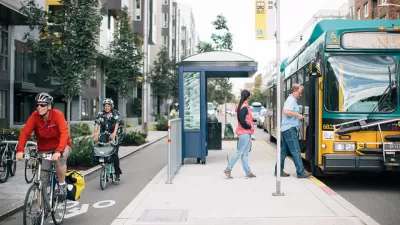The Northeast Ohio Areawide Coordinating Agency (NOACA) is moving forward with a groundbreaking policy to consider regional economic inequities when evaluating potential highway projects.

"A committee of the Northeast Ohio Areawide Coordinating Agency on Friday approved a new draft policy that would for the first time make racial and economic equity part of how it determines whether to approve new highway interchanges," reports Steven Litt.
The committee's decision to advance the new draft policy updates a story first shared by Planetizen in July.
Litt says that Northeast Ohio Areawide Coordinating Agency's (NOACA) full, 46-member board of directors "should approve the policy at its next meeting in December."
Grace Gallucci, executive director of NOACA is quoted in the article touting the policy's new approach to regional planning in Northeast Ohio. The goal of the policy is to "assess as much as we can the localized impact and the regional impact [of proposed interchanges], and to bring the board of NOACA the information so they can make a more informed decision," says Gallucci.
Litt's coverage also includes a list of the projects that would be subject to the new policy. NOACA's ability to veto projects would now be informed by newly detailed quantitative criteria for evaluating interchange projects like those listed in the article.
"New criteria would include detailed cost-benefit analysis of regional impacts on municipal budgets, economic development, environmental protection, quality of life, transit and bike use, and racial equity — both in communities receiving a new interchange and in adjacent and more distant communities," according to Litt.
FULL STORY: NOACA committee recommends policy to evaluate highway interchange proposals on racial, economic equity

Montreal Mall to Become 6,000 Housing Units
Place Versailles will be transformed into a mixed-use complex over the next 25 years.

Planetizen Federal Action Tracker
A weekly monitor of how Trump’s orders and actions are impacting planners and planning in America.

DARTSpace Platform Streamlines Dallas TOD Application Process
The Dallas transit agency hopes a shorter permitting timeline will boost transit-oriented development around rail stations.

Bend, Deschutes County Move to Restrict Major Homeless Encampment
City and county officials are closing off portions of an area known as Juniper Ridge where many unhoused residents find shelter, hoping to direct people to housing and supportive services.

High Housing Costs Driving Down Transit Ridership in LA
When neighborhoods gentrify and displace lower-income residents, transit ridership suffers, new research shows.

Iowa Legalizes Accessory Dwelling Units
A new law will allow property owners to build ADUs on single-family lots starting on July 1.
Urban Design for Planners 1: Software Tools
This six-course series explores essential urban design concepts using open source software and equips planners with the tools they need to participate fully in the urban design process.
Planning for Universal Design
Learn the tools for implementing Universal Design in planning regulations.
City of Mt Shasta
City of Camden Redevelopment Agency
City of Astoria
Transportation Research & Education Center (TREC) at Portland State University
City of Camden Redevelopment Agency
Municipality of Princeton (NJ)
Regional Transportation Commission of Southern Nevada





























